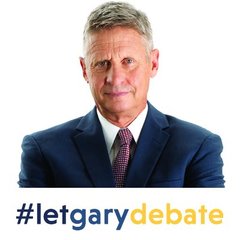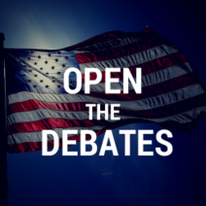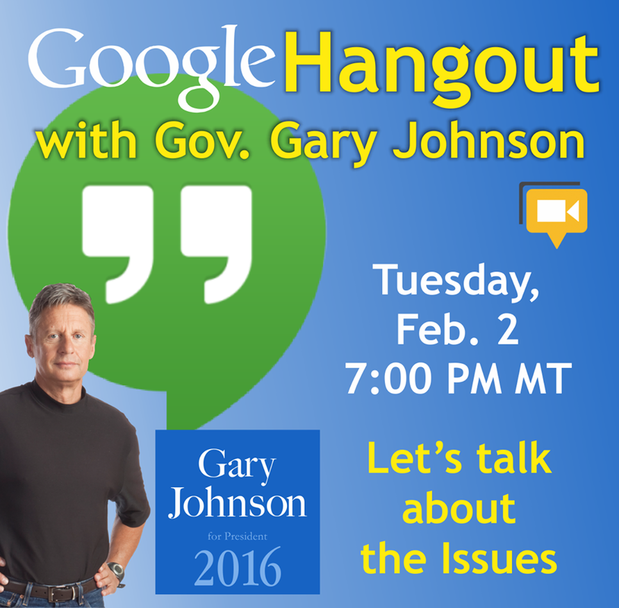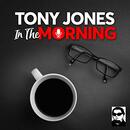 This coming fall you and I (and every person in all 50 states and Washington DC) will have the opportunity to vote for Gary Johnson in our state and as such I think that it's very important that we get a chance to see him in the nation debates along with the Republican and Democrat candidate. Currently the Congressional Debate Commission is using a standard of being over 15% in the polls, but that is a very flawed metric. The question that is asked is "If the election were held today, who would you vote for?" That question is DESIGNED to not have people answer "I don't know yet" and it punishes any "new" candidate if their party does not have an established base of voters who always vote the party ticket. The question is designed to not allow people to answer "I want to know more about them and make an informed decision." Why is asking people who they would vote for RIGHT THIS SECOND considered a good way to determine who should be in the debates to inform the public? Why is the poll question trying remove the influence of the people who want to make an informed decision BASED on the debates. Similarly, if 100 people are polled and 10 of them respond that they don't know who they are voting for yet, those votes are not counted as supporting Gary Johnson specifically, even those people have specifically said they are not convinced to vote for the Republican or the Democrat. The polls should not be asking people who they would vote for. The poll question that determines who should be in the debates should read as follow: "The following candidates will be on the ballot for President in your state. Please indicate all of them that you would like to see in the debate." It's very simple -- if a poll is being used to determine who is in the debates, that poll should ask about the debates. When that question is asked, 76% of Americans respond that they would like to see Gary Johnson in the debate. Count me among that 76%. Tony Jones is the Libertarian Candidate for North Kingstown Town Council and the RI State Director for Johnson/Weld 2016 PROVIDENCE, RHODE ISLAND (May 30, 2016) – On the heels of the Libertarian Party's selection of former governor of New Mexico Gary Johnson and former governor of Massachusetts William Weld to the presidential ticket at its convention this weekend, North Kingstown resident Tony Jones steps up as the state director for Johnson | Weld 2016 for Rhode Island. Jones is the at-large member of the executive committee of the Libertarian Party of Rhode Island (LPRI) and a state delegate to the national convention – which saw the largest attendance in the party's history. Under the Libertarian banner, Jones also ran for Lieutenant Governor of Rhode Island in 2014, on the platform to eliminate the office. The LPRI will become a state recognized party if the ticket receives at least five percent of votes. A recent national poll has Johnson receiving 10 percent of support from registered voters, drawing his strongest support from respondents under 35. Another national poll showed 44 percent of registered voters would want a third party to run against Republican presumptive nominee Donald Trump and the likely Democratic nominee Hillary Clinton. The Libertarian Party is the only third party with ballot access in 50 states. This means Johnson will be the only alternative to Trump and Clinton available to all voters in this election. Libertarians represent a growing plurality of Americans who are neither “left” nor “right” but who lean libertarian on issues of preserving individual rights and Constitutional liberties, smaller government, limited foreign intervention, and balancing the federal budget. To volunteer for the Johnson | Weld 2016 campaign, or for more information about the Libertarian Party of RI, Rhode Islanders should call 401-206-9194 or email Tony Jones at [email protected].  May 3, 2016, Santa Fe, NM — Gov. Gary Johnson released the following statement in response to Sen. Ted Cruz’s decision to withdraw from the Republican presidential nomination race: “With the withdrawal of Senator Cruz from the Republican race, the table for November’s election is set. Sen. Cruz fought hard, and for that he deserves credit, regardless of whether one agreed with him on the issues or not. His departure from the race, along with the likely nomination of Hillary Clinton by the Democrats, makes it clear that neither of the two ‘major parties’ will offer voters in November a small government candidate. What they are offering voters are two of the most polarizing candidates in recent history. “Polarizing as they may be, when the rhetoric is pushed aside, will either of those candidates shrink the government? Will either of them stop the military interventions that are not making us safer? Will either of them stop the government from spying on us citizens? And will either truly bring government spending under control, stop the deficits that are bankrupting us, and get the government off our backs so that Americans can find the jobs they want and put us back on a path to opportunity? “In November, there will be three candidates on the ballot in all 50 states: Donald Trump, Hillary Clinton, and the Libertarian Party nominee. I hope to be that nominee. With millions of Americans now feeling politically ‘homeless’, a two-term Governor who balanced budgets, cut taxes, cut regulations and truly reduced the size of government may offer the home they are seeking.”  April 19, 2016, Salt Lake City, UT -- Ed Clark, the Libertarian Party’s candidate for President in 1980, has endorsed Gov. Gary Johnson for the Libertarian Party presidential nomination. Clark won a record vote for an LP presidential candidate, gaining more than 920,000 votes. Clark’s vote reached 12% in Alaska, and in one county-level jurisdiction Clark’s vote topped 19.5%, beating the incumbent President Jimmy Carter. Clark won the 1980 nomination after securing more than 377,000 votes for governor of California in 1978, helping to secure major party status for the LP in the nation’s most populous state. Endorsing Gov. Johnson for the LP nomination for president, Clark remarked, “I am happy to endorse Gary Johnson for the Libertarian Presidential nomination. I am confident that his experience in 2012 will make him an even more effective campaigner in 2016.”  Washington, DC – Attorneys for presidential candidate Gov. Gary Johnson, the Libertarian Party, 2012 Green Party candidate Jill Stein, the Green Party and their respective vice-presidential candidates have filed a 55-page brief in the U.S. District Court for the District of Columbia opposing motions to dismiss their anti-trust lawsuit against the Commission of Presidential Debates (CPD), Gov. Mitt Romney, and President Obama. Bruce Fein, attorney for the Plaintiffs, explained that campaigning for the presidency is a multi-billion dollar business whose objectives include not only winning but attracting sufficient votes to influence the national political agenda. He added: “Frank Fahrenkopf, co-chair of the CPD, has touted presidential debates as ‘the Super Bowl of politics,’ whose advertising or brand value to Obama and Romney in 2012 approached $1 billion each.” Fein noted that independent experts have placed the value of free media earned by candidate Donald Trump in the 2016 presidential race to date at a staggering $2 billion. Johnson and the other plaintiffs in the lawsuit claim that participation in presidential debates is an “essential facility in the multi-billion dollar business of campaigning for the presidency; that presidential debates cannot be duplicated because the defendants agreed in writing in a Memorandum of Understanding to boycott all debates of joint appearance events with rivals outside CPD’s sponsorship; that defendants acting in concert arbitrarily denied Johnson and Stein access to presidential debates by establishing a 15% polling criterion to cripple competition in the business of campaigning for the presidency; and, that presidential debates can be conducted to optimize voter education by abandoning the 15% criterion but requiring debate participants to have qualified on enough state ballots to have a mathematical chance of winning an Electoral College majority. Applying that standard historically would have resulted in presidential debates with four to seven candidates, including Johnson and Stein in 2012, and would have enriched voter education. The United States Supreme Court has lectured: “Historically political figures outside the two major parties have been fertile sources of new ideas and new programs; many of their challenges to the status quo have in time made their way into the political mainstream. In short, the primary values protected by the First Amendment—‘a profound national commitment to the principle that debate on public issues should be uninhibited, robust, and wide-open,’—are served when election campaigns are not monopolized by the existing political parties.” Fein argued that Citizens United v. FEC “changed the business of campaigning for the presidency as profoundly as the internal combustion engine changed the business of transportation or the Internet changed the business of communications. The decision unleashed limitless corporate, union, and other funds into presidential campaigns that shattered all prior business models.” Fein amplified based on antitrust precedents: “Freedom to campaign for the presidency, including participation in presidential debates, means freedom for all and not for some. Freedom to campaign for the presidency, including participation in presidential debates, is guaranteed by the Constitution, but freedom to combine to keep others from campaigning or participating is not. Freedom from government interference under the First Amendment does not sanction repression of that freedom by private interests.” Fein further noted that “the CPD was born in original sin intending to limit presidential debates to the nominees of the Republican and Democratic parties” by “hijacking their sponsorship from the League of Women Voters.” The CPD, Gov. Romney and President Obama earlier this year filed motions to dismiss the lawsuit. In a filing this week, the plaintiffs responded to those motions and urged the Court to allow the case to proceed."  Two-term Governor to seek Libertarian Nomination January 6, 2016, Santa Fe, NM -- Former New Mexico Governor and 2012 presidential candidate Gary Johnson announced today that he is seeking the 2016 Libertarian nomination for President of the United States. Johnson made the announcement during an appearance Wednesday on Neil Cavuto’s “Coast to Coast” on the Fox Business Network. Johnson placed third in the 2012 presidential race, receiving more votes than any Libertarian candidate in history. Announcing his candidacy, Johnson said, “One need only to look at the Republican and Democrat nomination races to see that 2016 may very well be a ‘tipping point’ election year. The American people are clearly fed up and running out of patience with the status quo. I’m fed up with it also. “By the time Barack Obama leaves office, the national debt will have reached $20 trillion. It has doubled while he has been in office, just as it doubled while George W. Bush was President. Obviously, it doesn’t really matter which of the two so-called ‘major’ parties is in control of the White House or Congress. The government just keeps growing, the spending just keeps increasing, and the debt keeps piling up. “After two wars, seemingly endless foreign interventions and failed attempts at nation-building, can anyone credibly suggest that we are somehow safer today than we were 15 years ago? To the contrary, the threats to our safety and our liberty from violent jihadists are increasing, and if anything, we are less safe. The American people are tired of chaotic foreign and military policies that are obviously not fulfilling the government’s fundamental duty to keep the homeland and our freedoms secure. Voters are correctly demanding that their leaders focus on that most basic responsibility of the federal government. “And the American people are fed up with politicians -- both Republican and Democrat -- who are determined to replace liberty with government overreach, control and intrusion into our daily lives. The United States was founded on a rejection of warrantless searches, oppressive taxation, and government interference with the free exercise of speech, religion, and personal choices. Today, we have a generation of young people growing up believing their own government to be the greatest threat to their privacy and their freedom to pursue their dreams. “Our politicians and their refusal to abandon failed policies have sadly turned the governance of America into something the Founders would hardly recognize, much less embrace. "America needs a President who will push back against the growth of government -- and mean it. That begins with proposing a federal budget that doesn’t spend more than it takes in, and using the veto pen to enforce it if necessary. Government spends too much because it does too much, and a President who is serious about making government do and spend less can make it happen. “America needs a President whose idea of national security isn’t to spy on American citizens and pry into their personal and financial lives without warrants or due process. The failed War on Drugs needs to end, along with the surveillance, incarceration rate and needless prosecution it has given us. “And we need leaders whose idea of immigration reform consists of something more thoughtful -- and effective -- than building bigger walls, imposing unconstitutional religious tests, and militarizing our borders. “Our system is broken. The two ‘major’ parties have become slightly different shades of the same big government, big debt and ineffective status quo. I am convinced that Americans are ready to send Washington, DC, a message, to reject the status quo and break up the political duopoly that can’t even come up with a real budget and that is fundamentally incapable of change. What is missing is a belief that there is an alternative, a belief that the rigged game can, indeed, be broken up. “As a successful former Governor, an entrepreneur and a proven advocate for smaller government and greater freedom, I intend to offer Americans the alternative they seek. “Liberty and the freedom to succeed are the real American values, and I’m running for President to restore those values, make America genuinely safe, and put an end to a tired status quo that has given us nothing but debt, less freedom and well-founded fears about the future we are creating for our children and grandchildren.” For more information visit: GaryJohnson2016.com  When I completed my second term as Governor of New Mexico in 2003, I was done. I had been elected Governor when everyone said I didn’t have a chance. A businessman who had never sought or held elected office, running as a Republican in an overwhelmingly Democratic state, my prospects for success were dismissed by Republicans and Democrats alike. But I worked hard, financed my own campaign, and told New Mexicans what I would do if elected: Reduce the size of the government, cut taxes and apply business-like common sense to the job of governing. They elected me, I did what I said I would do, and they re-elected me by an even bigger margin. After that second term, I walked away to resume what was -- and is -- a pretty good life. I have had the good fortune to have climbed the highest mountain on all of the seven continents, got to build my dream home, and enjoyed the freedom I had gained from building a successful business from scratch, making some money, and creating the lifestyle I wanted. As for being Governor, I did a good job -- good government was easy. I worked hard. I did what I said I would do. I told people the truth, and I tried to run the state the same way I ran my business, and my life. Don’t promise what you can’t deliver. Deliver what you can on time and under budget. And most of all, don’t waste anyone’s time or money. I vetoed bills we didn’t need nor couldn’t afford, 750 of them. To this day, some call me “Governor Veto”. I cut the growth of government in half, and reduced the number of state employees by more than 1,000, without any mass firings or layoffs. All it took was good management and a willingness to challenge the status quo. We cut taxes. We shifted Medicaid to a managed care system -- similar to the health coverage for state employees -- and cut costs by at least 20%. I scrutinized regulations to be sure they were both essential and not unnecessarily burdensome for individuals and businesses. Dealing with a Democrat-controlled legislature, I certainly wasn’t able to do all that I wanted to do. Year after year, I proposed a full-blown education voucher program. The teachers’ unions and Democrats wouldn’t let it happen. But we put the issue on the front burner -- long before it was fashionable. In addition, I created quite a stir nationally by proposing, in 1999, that marijuana be legalized. I was the highest ranking official in the nation to do so, and at the time -- as opposed to now, it was not a popular idea. Everyone recognized, beginning with me, that it would be political suicide. But I didn’t have any further political ambitions, and more importantly, it was the right thing to do. Enforcing and prosecuting laws against simple marijuana possession were clogging up our courts, overcrowding our jails, costing taxpayers millions of dollars and doing permanent harm to thousands of young lives. All that because we had criminalized a nonviolent behavior that an estimated 140 million Americans have engaged in at some point in their lives. It didn’t make sense, and I said so. It wasn’t about marijuana being good or bad for an individual. It was about a modern-day Prohibition that was not only not working, but doing far more harm than good, at tremendous human and financial cost. My poll numbers fell through the floor for a couple of months, especially when the national media decided that it was a big deal that a Republican governor would take such a controversial and normally “liberal” stand. However, a funny thing happened. My approval rating recovered, and far more significantly, my political “suicide” helped prompt a national conversation that continues today, with a majority of Americans now supporting marijuana legalization. I enjoyed being Governor. I didn’t enjoy the politics, but it was undeniably satisfying to make a difference in people’s lives, force debates on issues that needed to be discussed, and put the principles of smaller government and greater freedom into practice. It’s one thing to talk about liberty. It’s another to actually govern with liberty as a guiding policy. I’d like to think I showed that it could be done. Apparently, some agree that it can be -- and was -- done. During the presidential campaign of 2012, the decidedly fiscally conservative Club for Growth looked at my record as Governor, and concluded that I would be a “pro-growth” President, citing our reductions in spending growth, the tax cuts we implemented, and the regulatory environment we created. At the same time, the ACLU also looked at my record, and gave me the highest rating on civil liberties of all the candidates, higher than Barack Obama and Ron Paul. I firmly believe that the majority of Americans are, in fact, “conservative” when it comes to the size and cost of government, while being socially “liberal” when it comes to individuals being free to make their own choices and control their own lives. That’s how I tried to govern, and what I believe today. After my term-limited service as Governor was finished, I largely stayed away from politics. I don’t like professional politicians, and certainly don’t want to be one. I went home, pursued my passions for skiing and cycling, climbed Mt. Everest, built my dream house and enjoyed my freedom. Sure, I stayed involved in some issues I cared about and in which I could make a contribution, such as drug policy and school choice. Life was good, and it still is. In 2009, I created the Our America Initiative, a not-for-profit advocacy organization with the mission of adding a needed fiscal conservative, socially liberal voice to America’s policy debates. That provided an opportunity to travel the country, organize at the grassroots and offer a “home” for those who share the notion of restoring freedom and opportunity as the real American values. And in 2011, I made the decision to run for President. I entered the race as a Republican, believing that America was ready for a different kind of GOP candidate who had a proven record of governing according to what I consider to be real conservatism: Government that is truly limited in size and cost and that stays out of American bedrooms and boardrooms. We fought hard, but the establishment and its special interest sponsors apparently didn’t want anything to do with a guy who would actually challenge the status quo and upset their apple cart. There was no room for a candidate who was once described as “the most dangerous politician in America”. After all, I wanted to talk about the spending, the wars and the freedom-robbing social policies that have become their bread and butter -- literally. The system is about fitting into their mold, and I didn’t fit. I couldn’t go to Iowa and evangelize about family “values” that are frankly none of the government’s business. I couldn’t go to South Carolina and talk about increasing defense spending at a time when we are broke. And I couldn’t go to Florida without telling the truth about entitlements and the need to reform Medicare and Social Security. So I left the Republican primary circus and switched to the Libertarian Party. Libertarians, broadly speaking, are fiscally conservative and socially liberal. The principles of less government and more freedom are there, and the experience of running as the candidate who could unapologetically advocate those principles was, well, liberating. With the help of hundreds and thousands of great volunteers and supporters, I traveled to virtually every state, spoke to hundreds of groups, met with students in colleges and universities all across the country -- and was gratified to be able to put our ideas on the national stage to an extent that had never happened before. We didn’t win, but we made the media and the establishment take notice and garnered more votes than any Libertarian candidate in history. Along the way, I learned a lot about the American people -- the most important lesson being a confirmation that the real majority doesn’t “relate” to either the Republicans or the Democrats, and if given the opportunity, will exercise a degree of political independence never before seen in our history. Americans, and especially the Millennials who are rapidly assuming a dominant role in both society and the economy, are fed up with politicians who lie, who don’t really want to change anything, and for whom being elected and reelected are ends in themselves. Now, those Americans are looking ahead to the 2016 election -- and if they are like me, they don’t like what they see. Is there anything about the current field of candidates that even hints at changing the disastrous trends of recent years? We are seeing only slight nibbles around the edge of a tax code that is fundamentally wrong. An $18 trillion debt that threatens the very underpinnings of our economy and, in fact, our national security, is hardly mentioned, all while the politicians are obsessed with Hillary Clinton’s emails and a County Clerk in Kentucky whose 15 minutes of fame have already lingered for too long. There were great hopes in some libertarian corners for Senator Rand Paul. I endorsed his father in 2008, and in fact, urged my Republican supporters in Iowa to support him in 2012. Unfortunately, Rand, in his quest to have one foot in the libertarian camp and the other in the establishment Republican museum, has emerged with a vague mix of positions that is clearly not compelling. There is a price to be paid for selling out -- and he is paying it. The previously presumed Republican front-runner, Jeb Bush, is fading fast as even “mainstream” Republican voters are increasingly refusing to take their orders from party leaders and funders who think he should be President just because he’s a Bush. Fairly or not, “been there, done that” isn’t working for a country that is absolutely fed up with business-as-usual. I could go on, but the point is clear: On the Republican side, Americans are seeing, with one glaring exception, a battalion of candidates who look, sound and feel like the same Republican presidential candidates voters have rejected in the past two elections. None are instilling any confidence that government would be smaller, smarter or less costly if they were to be elected than it is today. And about that exception…the Trump phenomenon. What does it say about the level of discontent that a professional salesman can launch a presidential campaign with a promise to build our very own Great Wall of China and a vague promise to “make America great again” can assemble a coalition of the pissed-off sufficient in size to make him the Republican standard-bearer? In the other “major” party, the choices are equally alarming. Ms. Clinton, their version of “been there, done that”, is having her own problems claiming the throne she presumes to be rightfully hers. Never mind the unbelievable lack of judgment involved in storing official, sensitive emails in a private server in a bathroom. We’re looking at a “front runner” who, as Secretary of State, presided over a descent into foreign policy chaos that is virtually unmatched in American history. As with Trump on the Republican side, the Democrats have devolved to the point that the candidate going toe-to-toe with Ms. Clinton, both in the polls and in fundraising, is Bernie Sanders, a self-described Socialist to whom the free market is not just foreign, but evil. His support, which like Trump, is befuddling the establishment, has nothing to do with socialism. He’s just the Democrats’ version of “none of the above” -- and if some of the polls can be believed, he’s winning. What does all this tell me? It tells me that America may finally be ready for a presidential candidate who DOES believe in the free market, but rejects crony capitalism and the subsidies, deals, bailouts and tax breaks that come with it. They may be ready for a candidate who actually governed a border state...and DOESN’T believe that a Great Wall is a substitute for immigration reform that today’s politicians cannot summon the courage to enact. Those Millennials who will soon be a full one-third of American adults may be ready to become engaged in politics with a candidate who wants to give them a government that will leave them alone, get its finances in order so that they don’t inherit an economic collapse, and stop labeling them as criminals for smoking a joint in the privacy of their own homes. And Americans who are rightfully and deeply concerned that a feckless foreign policy is allowing the likes of ISIS to not only threaten our safety, but humiliate us, may be ready for a candidate who will put politics aside and engage in reality-based foreign and military policies that actually fulfill government’s most basic responsibility to keep us -- and our freedoms -- safe. Maybe, just maybe, America is ready. And maybe that’s why I would want to run for President. Sincerely, Gary Johnson |
We'd love to hear from you
|


 RSS Feed
RSS Feed















